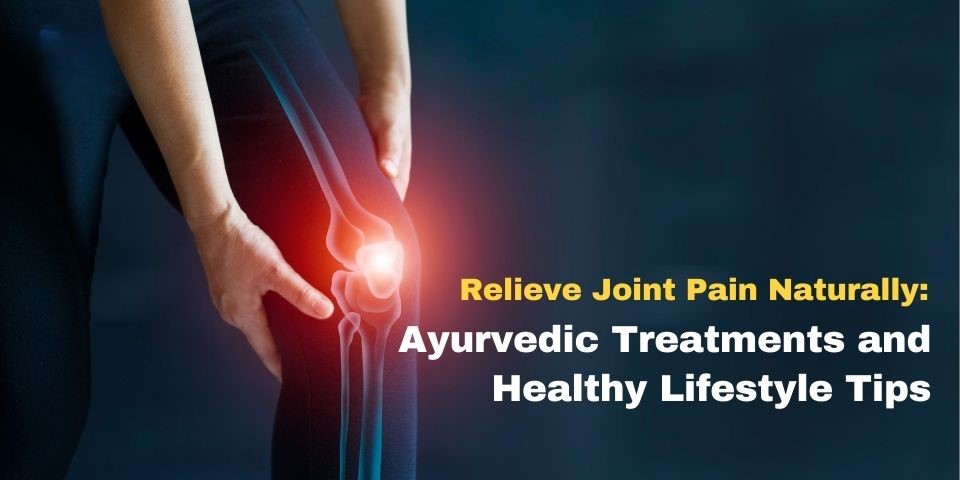“Joint pain is a common issue affecting millions, and Ayurvedic treatment for joint pain offers holistic remedies to alleviate discomfort and promote mobility. According to Ayurveda, joint pain is often caused by imbalances in the body’s energies, particularly the Vata dosha, which controls movement and circulation. we offer holistic solutions for managing joint pain using natural treatments and lifestyle adjustments to bring lasting relief and improve your overall well-being.

Understanding Joint Pain in Ayurveda
In Ayurveda, joint pain is categorized under a condition known as Sandhivata, associated with Vata dosha imbalance. Common factors like aging, poor diet, and lack of physical activity can cause an aggravation of Vata, resulting in stiffness, dryness, and pain in the joints. Ayurvedic treatments aim to restore Vata balance, reduce inflammation, nourish the joints, and improve flexibility for long-term relief.
Ayurvedic Remedies for Joint Pain
1. Herbal Oils and Massage (Abhyanga)
- Key Ingredients: Mahanarayan oil, Ashwagandha, Bala oil
- Method: Abhyanga, a warm herbal oil massage, is a key treatment in Ayurveda. The oils, such as Mahanarayan oil, have anti-inflammatory properties, improve circulation, reduce joint stiffness, and nourish both muscles and bones.
2. Herbal Supplements
- Ashwagandha: Known for its anti-inflammatory and joint-strengthening effects.
- Shallaki (Boswellia): An effective herb that reduces joint swelling and improves mobility.
- Guggul: A traditional Ayurvedic resin, used to reduce stiffness and improve joint health.
These supplements are prescribed to balance the doshas and provide long-term relief from chronic joint pain.
3. Panchakarma Therapy
- Virechana (Detoxification): This process eliminates toxins (ama) from the body, a key factor believed to cause joint inflammation.
- Basti (Enema Therapy): A therapeutic enema using medicated oils to balance Vata. It helps lubricate and nourish the joints, significantly reducing stiffness and inflammation.
4. Dietary Adjustments
- Vata-Pacifying Diet: Ayurveda recommends consuming warm, moist foods like soups, stews, quinoa, and oats to balance Vata. Hydrating and grounding foods help ease joint discomfort.
- Anti-Inflammatory Spices: Including turmeric and ginger in daily meals aids in reducing inflammation and pain.
- Foods to Avoid: Cold, dry, and processed foods can aggravate Vata, making joint pain worse.
5. Lifestyle Recommendations
- Yoga and Stretching: Practicing gentle yoga poses like Trikonasana (Triangle Pose) and Bhujangasana (Cobra Pose) can improve flexibility and reduce stiffness in the joints.
- Rest and Recovery: Ayurveda emphasizes the importance of resting your joints, especially during flare-ups, allowing the body to naturally heal.
Additional Ayurvedic Practices for Joint Pain Relief
- Ginger and Turmeric Paste: Applying a mixture of ginger and turmeric directly to the painful joint can offer temporary relief due to their anti-inflammatory properties.
- Steam Therapy: Heat treatments, such as steam baths or warm compresses, can ease joint stiffness and improve mobility by enhancing blood circulation and loosening tight muscles.
- Meditation and Stress Management: Since stress is known to aggravate Vata, Ayurveda suggests practices like meditation, breathing exercises (Pranayama), and daily relaxation techniques to keep the mind and body in balance.
Conclusion: Ayurvedic Joint Pain Treatment at Jeevan Jyoti Ayurveda
Incorporating Ayurvedic treatments for joint pain can offer natural, holistic relief. By balancing the Vata dosha with herbal remedies, Panchakarma therapies, and lifestyle changes like yoga and diet, you can experience improved joint health and mobility over time. For more detailed guidance on Ayurvedic treatments for joint pain, you can explore resources like the Ayurvedic Institute’s guide on natural treatments for joint pain.
For a personalized Ayurvedic treatment plan for joint pain, visit our Consultation Page. We believe in empowering our patients with natural remedies tailored to their specific needs.

 MAXX DZIRE M
MAXX DZIRE M
[…] Ayurvedic texts like Charaka Samhita and Sushruta Samhita extensively discuss the benefits of Abhyanga. Scientific studies also highlight the effects of Ayurvedic oil massage on stress relief, blood circulation, and joint flexibility. Learn more about Ayurvedic Treatment for Joint Pain. […]